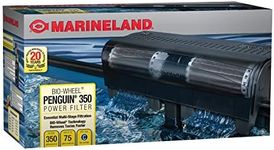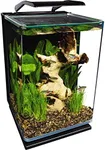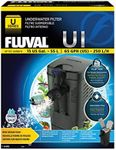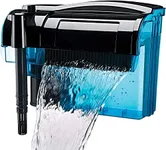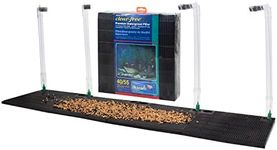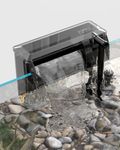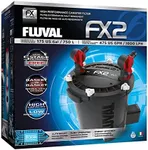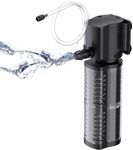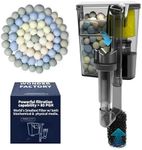Buying Guide for the Best Saltwater Fish Tank Filter
Choosing the right filter for your saltwater fish tank is crucial for maintaining a healthy and thriving aquatic environment. A good filter will help keep the water clean, remove harmful substances, and ensure that your fish and other marine life have the best possible conditions to live in. When selecting a filter, it's important to consider several key specifications to ensure you get the best fit for your tank's needs.Filter TypeThere are several types of filters available for saltwater tanks, including canister filters, hang-on-back (HOB) filters, sump filters, and protein skimmers. Each type has its own advantages and is suitable for different tank setups. Canister filters are powerful and can handle large tanks, while HOB filters are easy to install and maintain. Sump filters provide excellent filtration and additional water volume, and protein skimmers are essential for removing organic waste. Choose a filter type based on your tank size, the type of marine life you have, and your maintenance preferences.
Flow RateThe flow rate of a filter, measured in gallons per hour (GPH), indicates how much water the filter can process in an hour. This is important because it affects how well the filter can clean the water. For saltwater tanks, a good rule of thumb is to have a flow rate that can turn over the entire tank volume at least 5-10 times per hour. For example, a 50-gallon tank would need a filter with a flow rate of 250-500 GPH. Consider the size of your tank and the needs of your marine life when choosing the appropriate flow rate.
Filtration StagesFilters typically offer three stages of filtration: mechanical, chemical, and biological. Mechanical filtration removes debris and particles from the water, chemical filtration removes dissolved substances and toxins, and biological filtration uses beneficial bacteria to break down harmful ammonia and nitrites. A good filter should provide all three stages to ensure comprehensive water purification. Look for filters that offer multi-stage filtration to maintain optimal water quality in your saltwater tank.
Maintenance RequirementsDifferent filters have varying maintenance needs. Some require frequent cleaning and replacement of filter media, while others are designed to be low-maintenance. Consider how much time and effort you are willing to invest in maintaining your filter. If you prefer a low-maintenance option, look for filters with easy-to-access components and self-cleaning features. Regular maintenance is essential to keep the filter functioning properly and to ensure the health of your tank's inhabitants.
Noise LevelThe noise level of a filter can be an important consideration, especially if your tank is located in a living area or bedroom. Some filters operate very quietly, while others can be quite noisy. If noise is a concern for you, look for filters that are specifically designed to operate quietly. Reading reviews and checking the manufacturer's specifications can help you find a filter that meets your noise level preferences.
Compatibility with Tank SizeFilters are designed to work with specific tank sizes, so it's important to choose one that is compatible with your tank. Using a filter that is too small for your tank can result in inadequate filtration, while a filter that is too large can create excessive water flow that may stress your marine life. Check the manufacturer's recommendations for tank size compatibility and choose a filter that matches the size of your saltwater tank.


